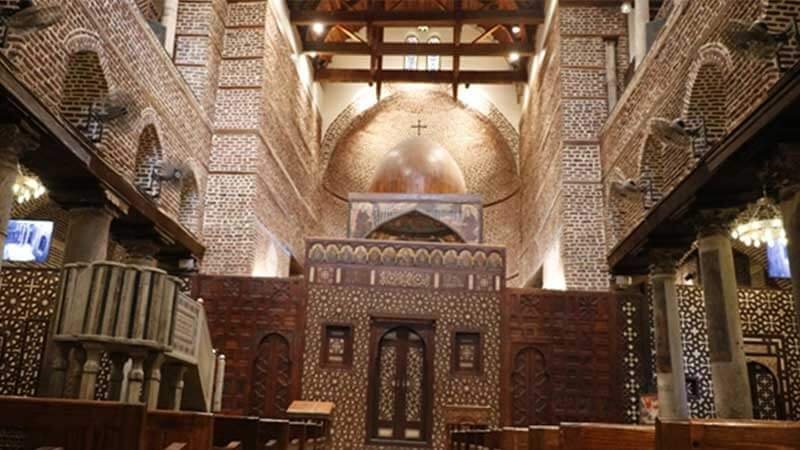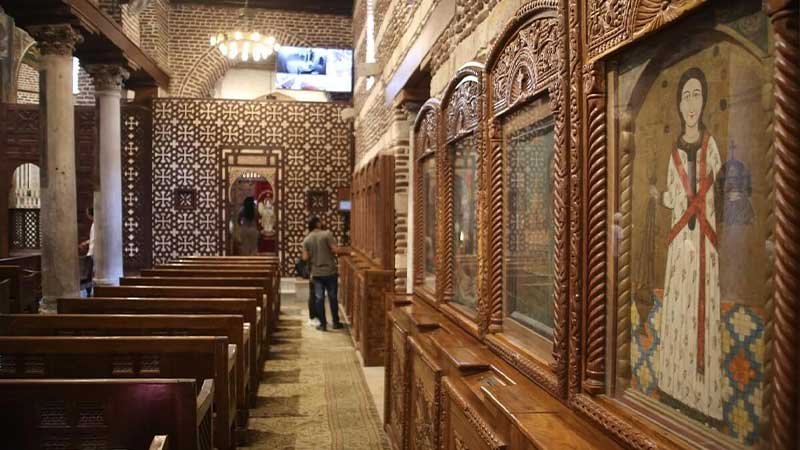Nestled within the enchanting historic ambiance of Egypt, the Church of Saint Sergius stands as an enduring symbol of the region’s rich religious and architectural legacy. This iconic landmark has captivated locals’ and tourists’ hearts and minds, inviting them to explore a realm where history, spirituality, and artistic brilliance converge. In this comprehensive guide, we invite you to embark on a journey with us as we uncover the captivating facets of the Church of Saint Sergius in Old Cairo, Egypt, delving into its historical background, architectural marvels, cultural significance, and spiritual resonance.
Don’t forget to read our related blogs:
Church of Saint Sergius in Egypt: An Architectural Marvel

The Church of Saint Sergius is a true architectural masterpiece, seamlessly blending artistic intricacy with spiritual devotion. Its unique fusion of Coptic and Romanesque styles sets it apart from other religious structures, making it a visual delight for history enthusiasts and art lovers alike. The church’s façade showcases ornate carvings, reflecting the cultural amalgamation prevalent during its construction.
Exploring the Historical Roots
The origins of the Church of Saint Sergius trace back to the early centuries of Christianity, making it one of Egypt’s oldest Christian sites. According to local tradition, the church stands on the very spot where the Holy Family sought refuge during their flight into Egypt. This historical connection lends the church a spiritual aura that resonates deeply with believers and history enthusiasts alike.
Cultural Significance and Influence
The Church of Saint Sergius serves as a cultural beacon, radiating the essence of Egypt’s diverse heritage. It has witnessed the ebb and flow of history from the Byzantine era to the modern day. Pilgrims and tourists alike are drawn to its hallowed halls, seeking to connect with the past and experience the profound cultural tapestry that defines Egypt’s identity.
Architectural Highlights: A Closer Look
- Coptic Influences: The church’s layout and design are strongly influenced by Coptic architecture, marked by its simplicity and reverence. The use of intricate woodwork and vibrant murals adds to its aesthetic appeal.
- Romanesque Elements: The marriage of Coptic and Romanesque styles is evident in the church’s arches, vaults, and columns. This fusion creates a harmonious architectural symphony that captivates visitors.
- Iconic Apsis: The apse, a semicircular recess, serves as the church’s spiritual focal point. Adorned with breathtaking frescoes and decorated domes, it is a testament to the artisans’ mastery.
Spiritual Resonance and Devotion
The spiritual significance of the Church of Saint Sergius is palpable, echoing centuries of devotion and worship. It has served as a place of solace, prayer, and reflection for generations of believers. The aura of reverence that envelops the church’s interior is an experience that transcends time, inviting all who enter to connect with their faith on a profound level.
Unveiling the Church’s Treasures
- The Holy Crypt: Descend into the depths of spirituality as you explore the church’s holy crypt. This sacred chamber is believed to have sheltered the Holy Family, imbuing it with sanctity.
- Ancient Relics: The church houses a collection of ancient relics, offering a tangible link to its storied past. These relics provide insight into the church’s history and the faith of those revered within its walls.

FAQs
What is the historical significance of the Church of Saint Sergius?
The church is believed to have provided refuge to the Holy Family during their flight into Egypt, marking it as a site of great historical importance.
How old is the Church of Saint Sergius?
The church dates back to the early centuries of Christianity, making it one of Egypt’s oldest Christian landmarks.
What architectural styles are prominent in the church’s design?
The church features a fusion of Coptic and Romanesque architectural styles, creating a unique and captivating aesthetic.
Can visitors explore the interior of the church?
Visitors can explore the church’s interior, marveling at its frescoes, woodwork, and spiritual ambiance.
Are there any artifacts associated with the church’s history?
The church houses ancient relics that offer insights into its history and the devotion of its worshippers.
How does the church resonate with the spiritual beliefs of visitors?
The church’s deep spiritual resonance creates a space for visitors to connect with their faith and experience a sense of awe and reverence.
Conclusion
The Church of Saint Sergius in Egypt is not merely a structure; it’s a living testament to the convergence of history, architecture, and spirituality. With its roots firmly planted in antiquity, it inspires awe and devotion in those who cross its threshold. From its architectural splendors to its historical significance and cultural allure, the church beckons travelers and pilgrims alike to embark on a profound journey through time, faith, and the heart of Egypt’s heritage. Come and immerse yourself in the timeless beauty of this remarkable landmark.


